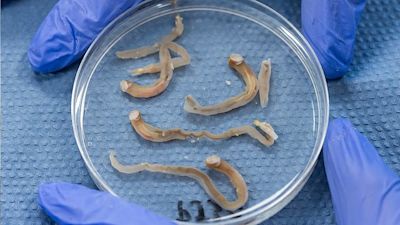Marine pest to be 'rebranded' as seafood more nutritious than mussels

Researchers at Plymouth University are hoping to rebrand a marine pest as nutritious seafood.
Shipworms, renamed "naked clams" had been viewed as a pest due to them boring through wood underwater, including shipwrecks and docks.
In a recent study, they found the saltwater clams converted wood into a "highly nutritious protein" which was high in levels of Vitamin B12 - almost twice that found in blue mussels.
A system had been designed to allow worm farms to be set up anywhere in the world, with wood and water being the only ingredients needed.
Lecturer in Marine Biology are Plymouth University Reuben Shipway said the worms may become a fantastic way to reduce your carbon footprint.
Mr Shipley said: "We urgently need alternative food sources that provide the micronutrient-rich profile of meat and fish but without the environmental cost. Our system offers a sustainable solution.
"Wild shipworms are eaten in the Philippines – either raw, or battered and fried like calamari – but we’re thinking of Naked Clams being more popular as a ‘white meat’ substitute in processed foods like fish fingers and fishcakes."
As Naked Clams do not put much energy into growing shells, they grow much faster than mussels and oysters which can take two years to reach a harvestable size.
However, the researchers are now turning the tables on the species and hoping to use their natural instincts as a sustainable and easy to cultivate source of food.
They have developed a fully-enclosed aquaculture system that can be completely controlled, eliminating the water quality and food safety concerns often associated with mussel and oyster farming.
The design means it can be used in urban settings, far from the sea, with wood and water being the only ingredients required.
The naked clam could also grow to a harvestable size in six months, compared to mussels and oysters which took up to two years, they added.
Dr David Willer, Henslow Research Fellow at the University of Cambridge’s Department of Zoology, said the system could be used in urban settings far from the sea.
He said: "Naked clam aquaculture has never been attempted before.
"We’re growing them using wood that would otherwise go to landfill or be recycled to produce food that’s high in protein and essential nutrients like Vitamin B12.”
Want a quick and expert briefing on the biggest news stories? Listen to our latest podcasts to find out What You Need To Know…